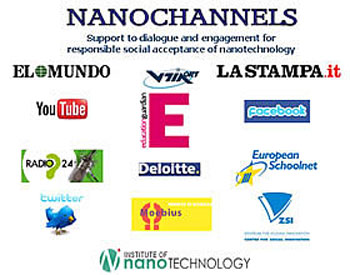| Jan 17, 2011 |
'It's good to talk': Nanochannels project to open lines of communication for public dialogue
|
|
(Nanowerk News) Nanotechnology issues are about to hit the mass media in a big way. The new EC-funded NANOCHANNELS project was launched last week with a two-day kick-off meeting that led to the planning of a dynamic programme of communication, dialogue, and engagement in issues of nanotechnology aimed at European citizens.
|
|
NANOCHANNELS has assembled a strong Consortium with partners experienced in mass media, educational methodology and science communication, as well as organisations highly suited and experienced in arranging outreach and communication activities for the public and schools. Following on from its highly successful track record in EC-funded projects, the Institute of Nanotechnology (IoN) has joined the consortium as scientific advisor and member of the editorial board to support the activities of the partners, who include The Guardian, La Stampa and El Mundo national newspapers, Ti Con Uno radio station, ZSI Centre for Social innovation, EUN European School Network, ORT Israel – who are coordinating the project – and Deloitte Israel, who are managing it.
|
 |
|
The main thrust of the NANOCHANNELS project is to provide stakeholders and the lay public with opportunities to engage in debate about nanotechnology innovation, applications, risks, ethical, legal and societal aspects through online and live forums, social networks, print media, radio, and a high-profile round table discussion. The overarching aim is to build trust and achieve a social consensus in the development and implementation of nanotechnology.
|
|
The project draws and expands on the results of highly successful EC-funded projects, including NanoYou, NanoForum, NanoTV, NanoSciEra, and Time for Nano, and will pioneer outreach and communication activities targeting the general public, with a special focus on stakeholders and young people. To maximise geographic coverage, NANOCHANNELS will take place in at least six EU Member States and Associated Countries, and will be disseminated in five languages.
|
|
NANOCHANNELS will also act as a bridge between Framework Programmes 7 and 8. By building on the best practices derived in related FP nanotechnology Coordination and Support Action projects, and consolidating these with the results of NANOCHANNELS, the IoN will lead the partners to provide a series of recommendations to the EC on communicating and engaging with future nanotechnology issues in time for consideration in the drafting of FP8 NMP topics
|
|
Achieving these objectives will enable the partners to deliver sound recommendations to the European Commission concerning governance and best practice for communication of nanotechnology issues within the European Union.
|
|
Speaking at the project launch, Mark Morrison, CEO of the Institute of Nanotechnology, said: 'We are excited to be part of this ambitious project which will look at what issues are really important to the wider public, and in particular schoolchildren. Understanding how tools, such as debates and social networking sites, can be effective in this dialogue will be useful for supporting future policy in the European Union and building public consensus on new technology.'
|

